Zurich students to study Swiss wartime role
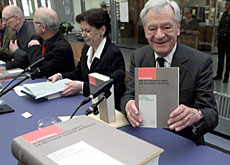
A five-year report into Switzerland’s wartime role is to be adapted for use in Zurich schools.
Zurich’s education department gave the go ahead for a textbook of the report to be produced. It will be introduced into the curriculum in Spring 2005.
Entitled “Admit, suppress, inquire: Switzerland and the time of National Socialism”, the 124-textbook will present the findings of the Bergier report in a shortened form for students aged 14 to 18.
The book will be made available to all schools in German-speaking parts of the country, but will not be obligatory.
Completed in March 2002, the Bergier report was highly critical of perceived failures by the Swiss government and private industry.
Headed by history professor Jean-François Bergier, the study found major failings in national policy – particularly in Switzerland’s treatment of refugees, its cooperation with the Nazi regime and its lacklustre attempts at restitution.
The move to introduce such a book has been opposed by some Swiss who claim the study gave an unbalanced view of their country’s actions during the Second World War.
Bergier’s backing
Although not directly involved in the classroom version of his report, Bergier has already given his blessing to the project.
“The original report is enormous, about 11,000 pages in all,” Bergier told swissinfo, “and I think a shorter version is necessary if we’re to make the findings accessible to young people.
“I also hope the public at large will show an interest because it’s always very important for a population to know about its own heritage – the good and the bad. A nation can only have a clear view of its future, if it also has a clear and accepted comprehension of its own history.”
Critics
Largely praised by the Swiss government and media upon its publication last year, the Bergier report was not, however, accepted by everybody.
As president of a Second World War interest group, Swiss People’s Party parliamentarian Luzi Stamm is one of the report’s biggest critics.
“I realise that any new textbooks dealing with the Second World War will have to mention the Bergier report,” says Stamm. “But I am afraid that this book will adopt the same basic tone as the Bergier report, a tone which stressed only the negative points.
“In six years of war, mistakes are obviously made. But the Bergier report chooses to stress the one refugee turned away from Switzerland rather than the 99 accepted, or dwells on the few individuals who backed Hitler rather than the many who opposed him.”
Jewish approval
Bergier himself has always denied that his report was “anti-Swiss” and told swissinfo that he hoped the publication of the school text book would help prove this.
The professor’s hopes are shared by the Swiss Federation of Jewish Communities.
“This is something we have fought for since the publication of the Bergier report,” federation president Alfred Donath told swissinfo.
“We think it’s very important that the younger generation knows about the attitudes of Switzerland during the Second World War and about what happened to Jews at that time.
“I agree that we should not just focus on the bad things, though, because there were a lot of Swiss who risked their lives to help Jews during the war.
“But it is vital that the public accepts what happens and realises that Switzerland’s behaviour wasn’t as impeccable as it was once portrayed, so that we can avoid anything similar in the future.”
swissinfo, Mark Ledsom in Zurich
The Independent Commission of Experts, headed by Jean-François Bergier, presented its final report in March 2002.
The Commission took five years to complete a total of 25 reports.
The experts found there had been “egregious failures” by the Swiss government and by private industry during the Nazi era.

In compliance with the JTI standards
More: SWI swissinfo.ch certified by the Journalism Trust Initiative
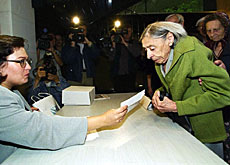
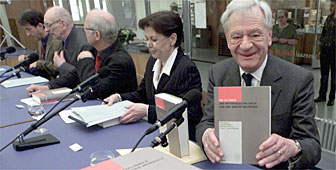
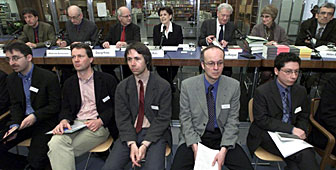
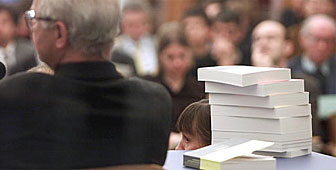
You can find an overview of ongoing debates with our journalists here. Please join us!
If you want to start a conversation about a topic raised in this article or want to report factual errors, email us at english@swissinfo.ch.